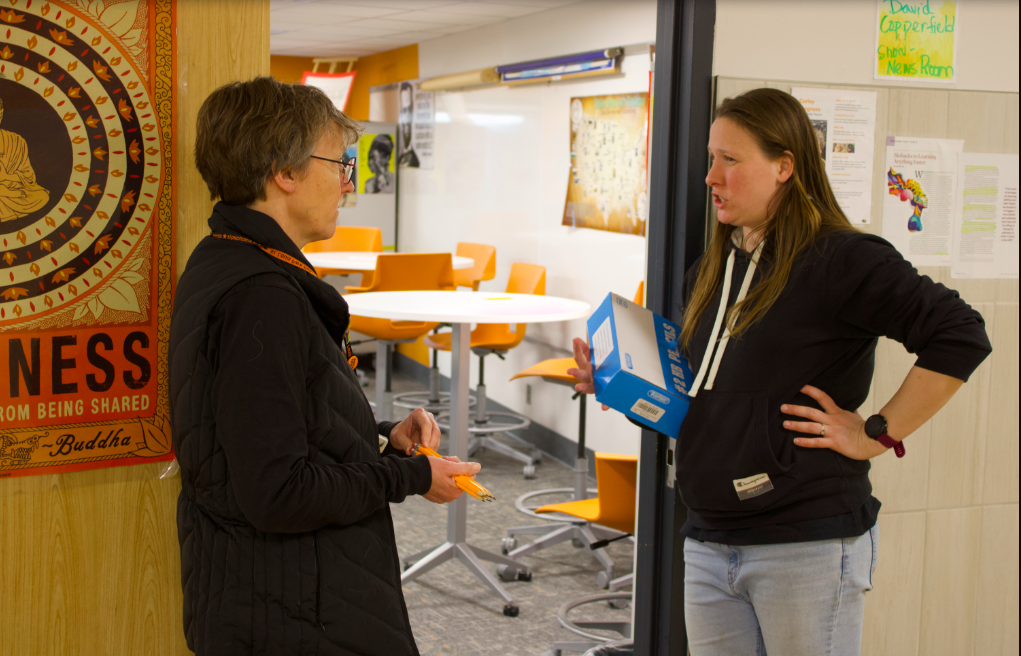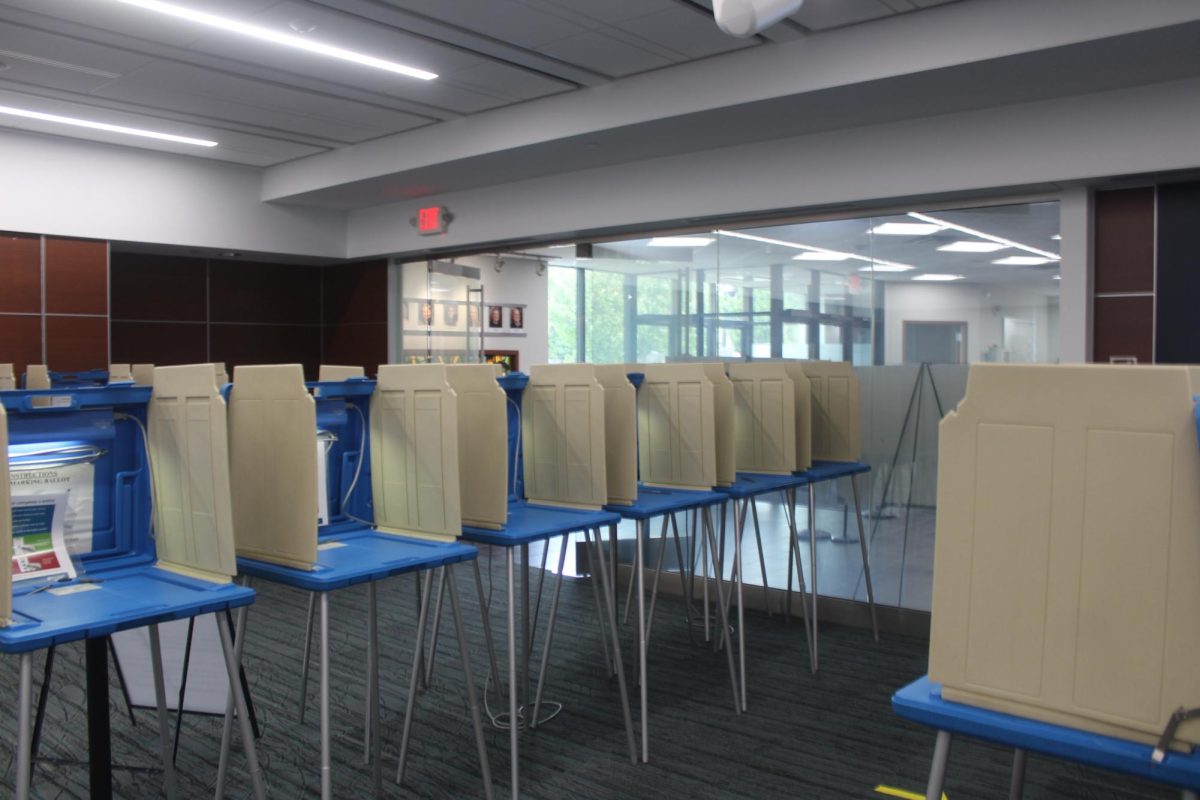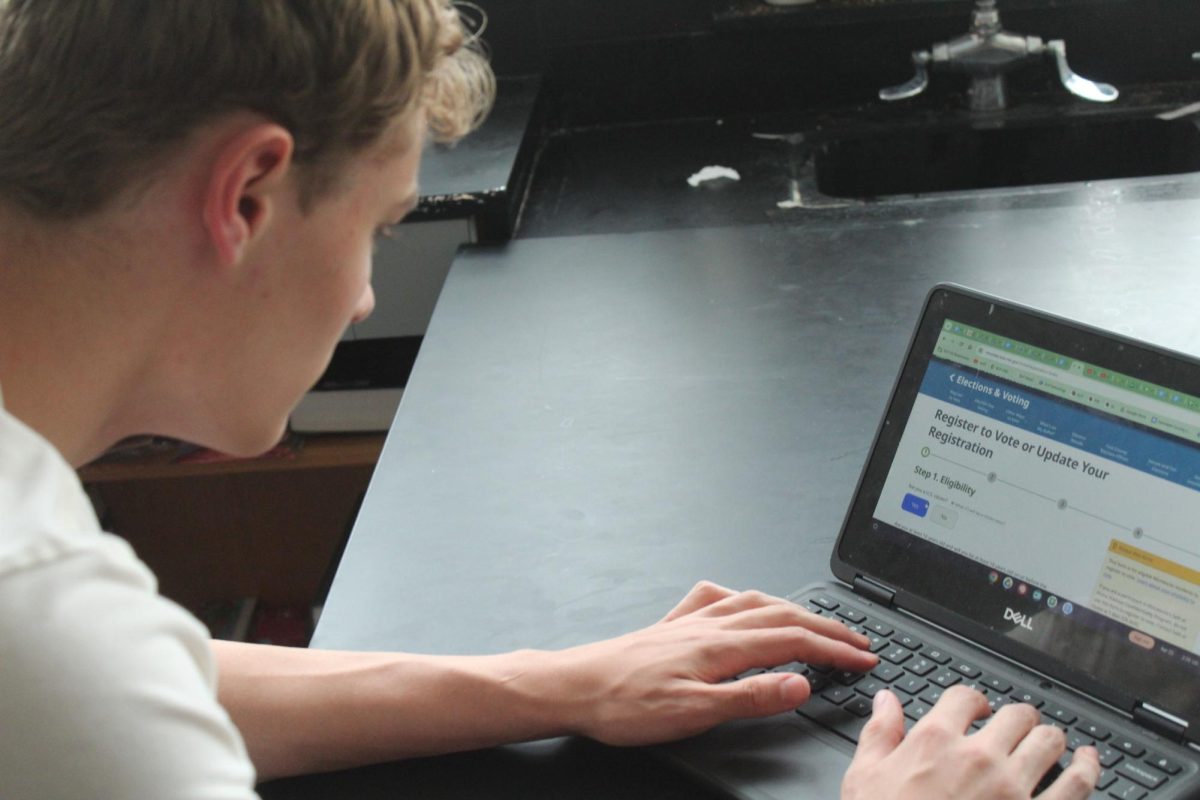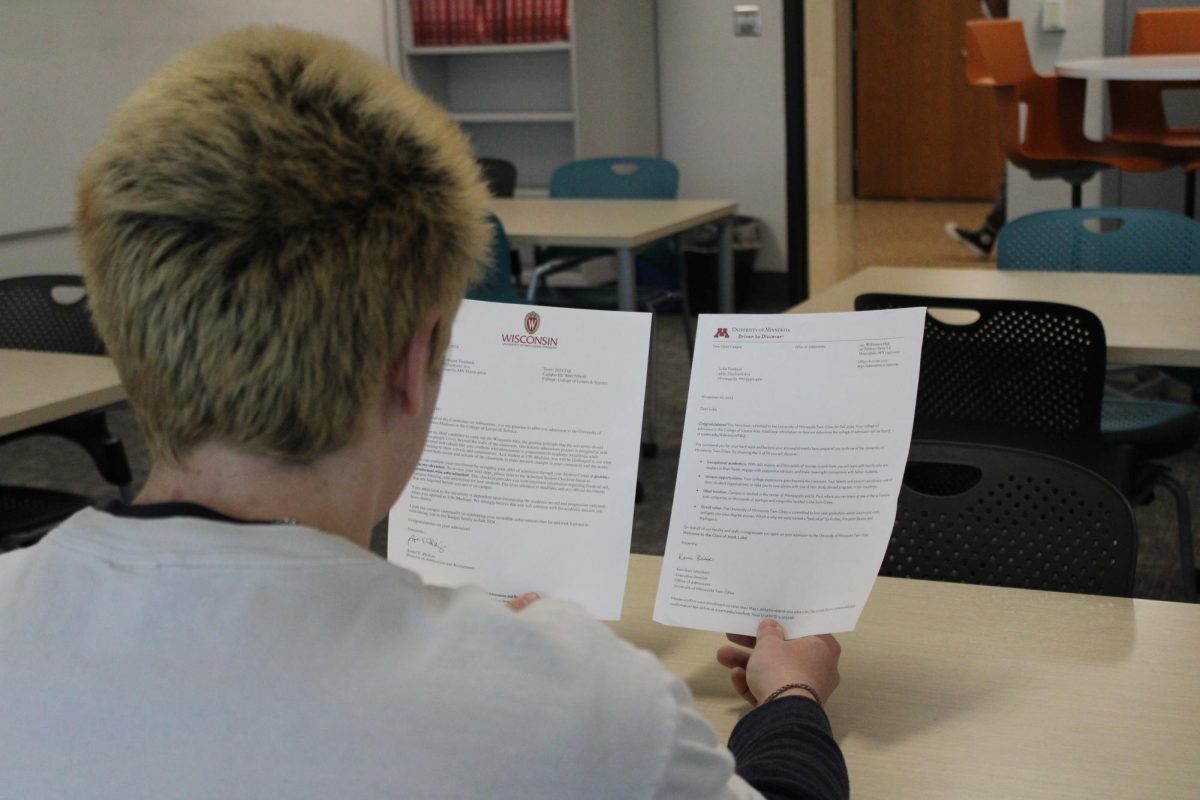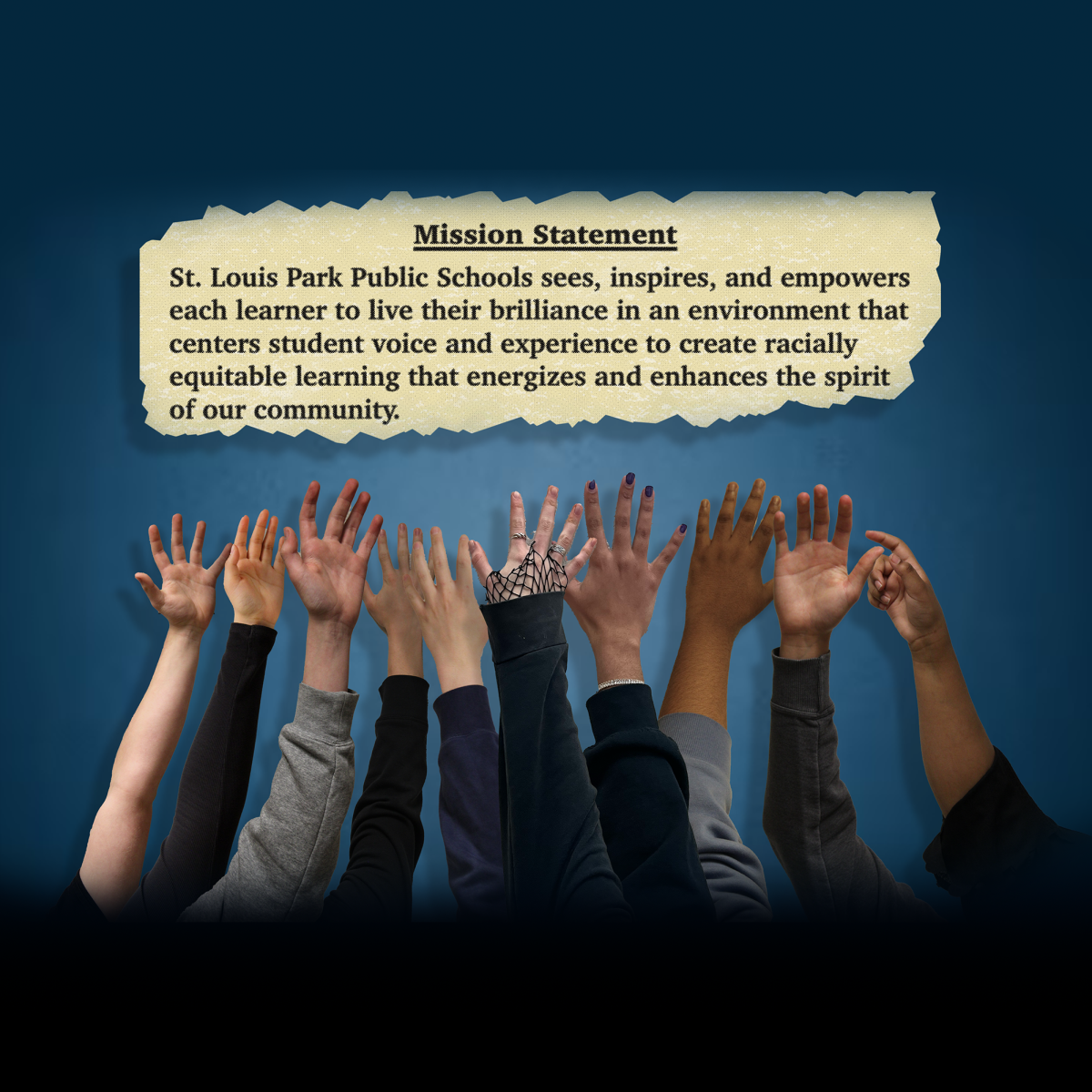A call to conversation
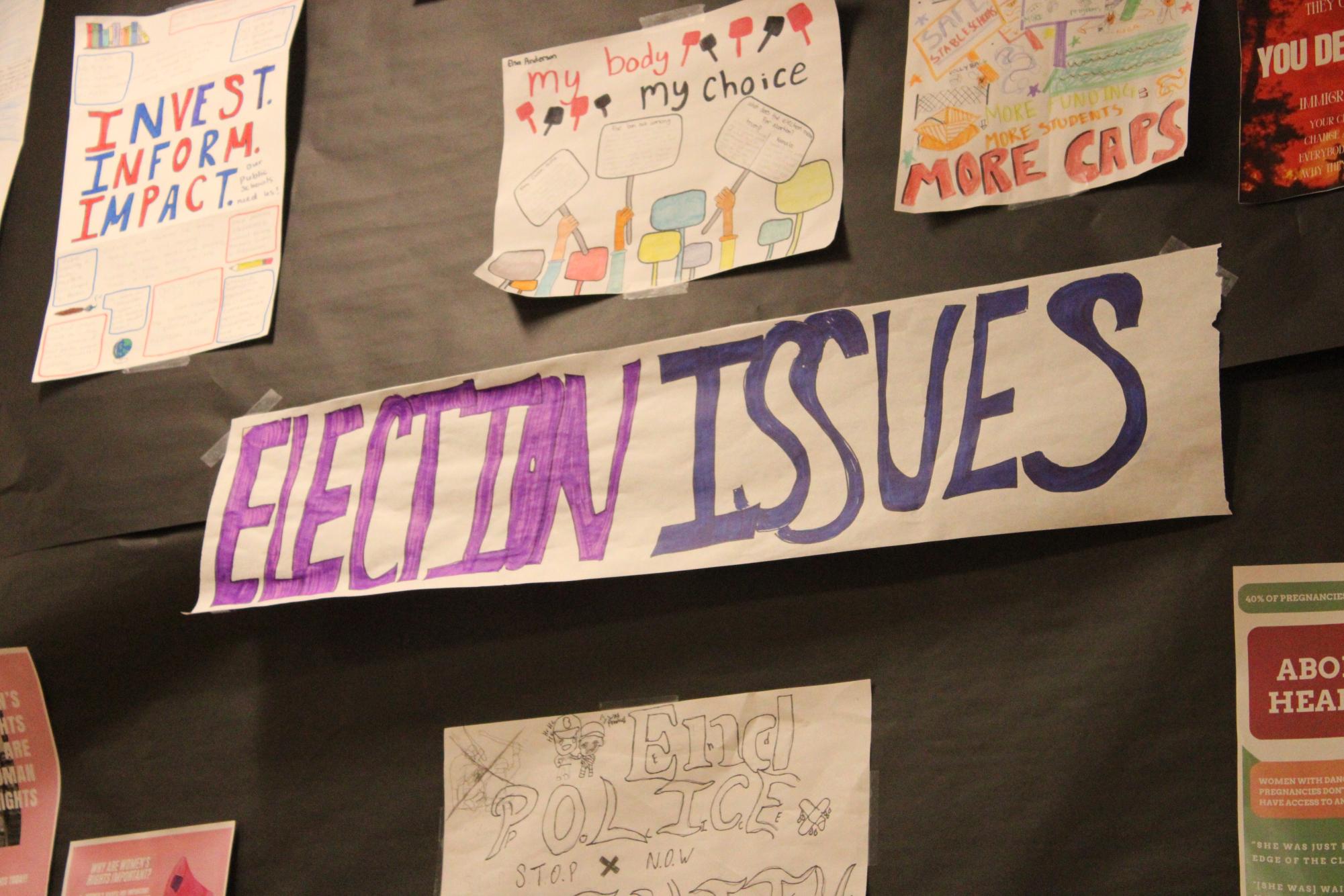
To our readers:
Over the past year, we have been working to produce holistic coverage on the Israel-Palestine conflict. We wanted to allow time for Park’s community to process and reflect on the conflict prior to seeking out community input. In order to create well-developed coverage that does not cause further harm, time and space were necessary for Echo to provide a piece of work that is accurate and relevant to our student body.
We are not publishing or taking a stance on the Israel-Palestine war. Echo is a publication that exists to amplify community voices, so we have used resources such as The Student Press Law Center’s policies and ethics to scope the story in a way that does not take stances on political issues or cause further harm to our community.
In an effort to balance the various perspectives of the student body, we have worked closely with members of our publication to create a diverse interviewee list. While amplifying those personally connected to the war is important, it is also valuable to highlight perspectives from individuals without direct ties to the conflict.
As reporters, personal biases are inevitable, but our job is to be impartial. We’ve tried to scope this story around discussions and relationships within the community rather than opinions or facts surrounding the conflict. If you have editorial concerns, we welcome letters to the editors. Letters must be signed, no longer than 250 words and emailed to slpecho@gmail.com or submitted to room C275. For more information, reference our media policies.
Alicia Mainjeni, Anya Panday and Sarah Peterson
Echo Editorial Directors
Rabbi and Hebrew teacher John Carrier said the past year was marked by many sensitive events for Park. Carrier said he created spaces in his classroom for students with personal connections to the Israel-Palestine conflict to engage in open conversation and reflection.
“There have been multiple shifts (in classroom environments) because it’s been a long year with lots of different events,” Carrier said. “Oct. 7 was a Sunday. When we all came back to school on Monday, it was a very different mood. Last year, I was only teaching Hebrew (and) all of my students were Jewish. We had things to learn together, but I also wanted to hold space for what they were going through and what they were experiencing in their community. There were students of mine who had gone to summer camp with people in Israel who were affected, either who were harmed or in the army, and so it was very personal (because) many of my students have traveled to Israel or have family there.”
According to senior Sarah Tirado, misinformation spread among peers causes harm to those tied closely to the war.
“Sometimes this is a tough school environment to be (in) during the conflict because a lot of people get misleading information from online, and I know there are a lot of people in the school who have strong opinions about the conflict who don’t have any connection to it,” Tirado said. “That can sometimes be kind of harmful to us who have family, friends and personal connections to the actual conflict. When people just believe there’s a lot of people at our school who will just be supporting sides of the conversation that they don’t really know much about, and that can be kind of harmful.”
Junior Otoha Masaki said the absence of dialogue leads to a reliance on misinformation on social media. Masaki said a solution could be a facts-based resource provided by the school that gives unbiased information about the war to students.
“It is because of the lack of discussion within the school environment because on social media, even if we try to keep our sources unbiased, it’s going to be biased no matter what,” Masaki said. “If the school could provide unbiased information based on facts, people would be less biased toward one side or the other and could see the overall picture. That would make (the student body) less divided.”
According to junior Zainab Noor, she hesitates to speak out about the Israel-Palestine conflict in school due to the sensitive nature of the topic.
“I’ll say it has made me feel like I can’t really talk about this conflict as much as I want to in school, and this is something important to me,” Noor said. “Any opportunity I get, I am weary to speak (up about it in) the school environment because I know it’s not a welcome topic—usually conflicts aren’t a welcome topic at Park.”
Tirado said she feels uncomfortable discussing her opinions around the Israel-Palestine conflict at Park because she worries people will be unreceptive due to the varied opinions and information circulating around the conflict.
“A lot of people have really strong opinions about the conflict, and some of those opinions are based on inaccuracies and misleading information that people receive,” Tirado said. “I do not feel like I could comfortably express my opinions at Park because I think a lot of people would have negative responses to my opinions. I just don’t think that I would talk about it.”
Carrier said the presentation SOAR (Students Organized for Anti Racism) members made to teachers about the Israel-Palestine conflict was insightful. He said when teachers don’t encourage discussion in the classroom, students are left to get their information on social media.
“One thing that was really astute in this presentation that some SOAR students made is (when) they said social media is where students get information when the adults aren’t talking, and social media is necessarily biased and inflammatory,” Carrier said. “If all the students are seeing is what’s happening on social media, all they’re seeing is the biased and inflammatory stuff, right? The more we could model civil, respectful dialogue (and) safety in sharing brave things, the more our students will learn from that, and then the better we serve our students.”
According to social studies teacher Charles Mahaffey, teachers have faced challenges in addressing conflicts in the Middle East with their students.
“We have kind of been grappling with how to approach teaching this issue, talk(ing) about this issue, and then a lot of staff for the first time have not in their life, but maybe in their career, have tried to figure out where they stand on this issue, what they know about it and what they need to learn about it,” Mahaffey said. “There’s a lot of people who haven’t really known anything about conflicts in the Middle East beyond the war in Iraq and Afghanistan with the United States. A lot of people are learning about those things for the first time. This is evident, and this isn’t news to anybody, but there’s been tension with staff about ‘how do we learn about these things?’, ‘how do we teach about these things?’—SOAR coming and doing a teaching station with us—anybody who was there would probably speak the same way. I think the things that students feel we also feel—we’re also here to work, so (that) also determines how we show up for students.”
According to senior Paige Descarpentrie, holding conversations about the conflict can be challenging because of the strong feelings members of the community have. She said conversations on approaching these sensitive topics in an academic setting are more productive.
“It’s a really heavy and personal topic for everybody,” Descarpentrie said. “There’s no factual way to talk about it because everybody has strong opinions. Maybe not (having conversations) about the issue itself, but having conversations with how to deal with issues like this in school settings because it is really important to a lot of people. It’s hard to go to school when you’re feeling so strongly about something. So, having conversations about how to deal with that, (and) not the issue itself.”
Mahaffey said facilitating discussions positively can benefit the community. He said it’s important to understand when others aren’t in the headspace to engage in challenging conversations.
“Discussions can just become arguments if they’re not facilitated well, but I also think that discussions facilitated well and approached from not a positive perspective, but a perspective that ‘we want the same thing’ can be really productive and lead to healing,” Mahaffey said. “I also think it’s really important to recognize when people can’t have conversations. I know that that’s a tough thing for people to hear, but sometimes you’re just literally not in a space where you can have a conversation. If I got in a fight with someone, I couldn’t probably talk about why that thing happened and how we could restore our relationship five minutes after that happened. Sometimes it takes time and space for emotions to process.”
Noor said she feels restricted when discussing her opinions on the Israel-Palestine conflict at Park.
“There’s always, whether it’s silent or spoken, a warning to watch what you say, (to) carry discretion and be mindful because anything can be deemed as either offensive or hurtful,” Noor said. “I have personal experience with this because I have been told to watch what I’m saying because it’s hurtful, despite it not being at all, but it might have just been my perspective. In my opinion, it wasn’t hurtful. I was just stating facts.”
Mahaffey said discussion around the Israel-Palestine conflict can be difficult to effectively facilitate due to the diversity of lived experience surrounding the conflict. He said finding time and space to have in-depth discussions can be difficult.
“People have different approaches to talking about this issue. A lot of people have felt like teachers maybe don’t know enough about it to talk about it but also it’s a scary, uncertain thing,” Mahaffey said. “It’s been difficult for people to come together and come up with a clear idea of what teaching (about) it looks like because no one wants to be wrong because we all feel like the stakes are so high (and) we don’t want to hurt anybody in our community. You have to come to school every single day, you have to teach and you have to keep moving. So it’s also hard to figure out how to slow down enough to have those conversations and then move forward with care on this topic because things just keep moving, things don’t stop.”
According to Principal LaNisha Paddock, the administration’s ask for faculty last year was to prioritize reflective listening over fact-based classroom discussions to minimize the harm brought to the community.
“We were asking people to be more reflective in their listening and learning, rather than bringing it to students and (saying), ‘This is what I know about it, and I’m going to teach you about the things that you should know about this particular topic,’” Paddock said. “It was all in an effort to make sure that we weren’t creating more harm than has already been done because there’s multiple community members that were harmed throughout the last year.”
Carrier said he felt the decision to not facilitate discussions within the classroom was well-founded, as it prevented rising tension. However, Carrier said he knew many students struggled with not discussing the Israel-Palestine conflict, and he is collaborating with the leaders of SOAR to begin facilitating productive dialogue.
“There’s a diversity of opinion within (the) faculty. It was probably for the best last year that the administration’s decision (was) to not encourage dialog in the classroom setting,” Carrier said. “It could have been triggering for a lot of people, or maybe not handled well. There was a good decision not to exacerbate the tension. At the same time, a lot of students, regardless of what side they’re on, felt like they weren’t able to discuss it and they weren’t able to share their opinion or learn more. There were positives and negatives. I will say one thing, I’ve been speaking with the faculty leaders of SOAR and later on in this semester, I think we want to get some good dialog going between Jewish students, between Muslim students, between diverse students. Not necessarily (to) figure out the war here, but for a diverse group of students to share their own reactions. Not what their opinion is about this, but how it’s affecting them personally. We can have some very productive dialog there. I’m really encouraged by it, and grateful to the leaders of SOAR for helping to make that happen.”
According to Masaki, while she was able to discuss the Israel-Palestine conflict in SOAR, she felt that discussions within the classroom were shut down.
“Not during classroom time. We talked a bit during SOAR, but that was mainly for the event we hosted. It was really hard to talk about it outside of SOAR just because of the pushback from the admin, and it’s also obvious that the head of the school doesn’t want us to talk about it,” Masaki said. “Even one of the teachers during history said, ‘I’m not allowed to talk about this, but I do want to take a moment to acknowledge today is Oct. 7.’ She wasn’t able to go into detail or any sort of context into (the conflict).”
Descarpentrie said that while discussions around the Israel-Palestine conflict have the ability to cause harm, school environments are the place to hold safe, productive discussions that incorporate diverse perspectives.
“There (are) ways (to discuss) that harm people because it’s a very sensitive subject, but school is the place that we should be talking about issues in our world and issues that affect so many people, especially because we have so many different perspectives on the issue at our school too,” Descarpentrie said. “It can be really hard to talk about it, but I feel like school is like a place to do that safely.”
According to english teacher Andrew Carlson, Park staff have been focusing on how impact outweighs the intention of words, and how it’s important to be mindful of how word choice may impact others.
“Your words and your sentence construction do matter. I’m not saying you walk on eggshells to please everyone, but you need to go about (it) in a way that is respectful to everyone involved,” Carlson said. “One of the big things that we’ve gone through as a staff when it comes to how we engage with students, how we engage with each other is the intent versus impact. Intent doesn’t mean anything. You have to understand the impact and that just because you say, ‘oh, I didn’t mean it that way, you shouldn’t take it that way.’ That’s, in a way, an irresponsible thing to say. You need to understand that words have an effect and the whole old adage of ‘sticks and stones can’t break my bones’ is literally true, but not figuratively true.”
According to Carrier, hard discussions must be preceded by building relationships between participants in order to avoid unproductive conflict. He said if trust is built and participants are intentional about their phrasing, it is possible to disagree and still remain as a connected community.
“If we get into those hard questions without establishing trust, people just wind up yelling at each other, not listening to each other, talking around each other (and) nobody wins. Nothing good comes from that,” Carrier said. “But, if you go into these discussions setting the right intention, coming from a place of ‘I’ statements versus ‘you’ statements. You can talk about hard things, and you can talk about things that we have strong opinions and strong feelings about, if you do it right, with the right intention, with the right guidelines, with the right boundaries. People can, even people with strong and opposing opinions, can still walk away as friends.”
Carlson said that discussion is important to understanding difficult subjects, but discussions must follow reasonable structure, such as including a facilitator to ensure discussion remains respectful.
“Sweeping something under the rug isn’t just gonna get rid of it. There needs to be certain guidelines sometimes around having the conversation,” Carlson said. “Having a facilitator, having a mediator, having someone, a teacher, who knows what they’re doing in class to be able to facilitate the discussions and say, ‘okay, take a step back here because instead of approaching this in the fashion that is required here, you’re kind of going on the attack and we shouldn’t be attacking here.’ Being able to facilitate those types of discussions is very important.”
According to senior lecturer in the Department of Curriculum and Instruction at the University of Minnesota, Cynthia Zwicky said when structuring a difficult discussion, more faith should be put into students to help lead and teach their peers.
“In general, we don’t give enough credit to the potential of students and what they think and what they know. We often see schools as a place where the students think they’re going there to sit and get some information and they don’t see themselves as co-creators of the learning. That’s kind of by design—schools have long been unchanged in how we allow equal voice in the classroom and where the power lies,” Zwicky said. “When you are able to think differently about power in the classroom, who holds it, who has agency, who has voice, and you start to share it, then you develop ways where students are more comfortable to start initiating these conversations. If we have rules that say we can’t talk about this, I mean, I don’t think that’s a rule, that’s censorship, but to me, it sounds like that’s being established because there’s some kind of fear of ‘I don’t know what will happen if we allow people to express themselves.’”
According to Carrier, going forward Park will benefit most not from setting strict rules around discussion, but having leaders model the kind of dialogue they hope to see within the classroom.
“We do best not by laying down the law and writing regulations up on the board, but by modeling the kind of dialogue that we want to see the students having, and then making room for that dialogue,” Carrier said. “It’d be wonderful if members of (the) school administration or the superintendent’s office got together and had a dialogue about the difficult subject in front of the teachers in order to model the effective way to do that. Then the teachers, in turn, get together and have a dialogue about difficult subjects in front of the students. Leadership isn’t about laying down the law. It’s about setting an example. If the administration wants the faculty to have good dialogue, they model that. If the faculty and staff want the students to have good dialogue, they model that.”
According to Tirado, skewed social media outlets play a role in the ongoing disconnect between the Park community. She said while division due to disagreement on the Israel-Palestine conflict is common, educating one another through conversation is a more productive alternative that will allow for open-mindedness.
“If people as a whole throughout society, not just Park, were more educated about the topic, there wouldn’t need to be such (a) strong division,” Tirado said. “With all political issues, there’s a lot of strong division nowadays—partially because of social media, and everyone hears their own types of beliefs. That definitely does impact this topic because it makes people more divided on the subject because they’re hearing a lot of the same information about what they already believe. People have some really strong opinions about this conflict, even if it has nothing to do with them. Division is definitely a big thing, not just in Park, but regarding this issue for everyone and if we foster more discussion about this then there wouldn’t be so much division.”
Noor said learning is a continuous process that requires open-mindedness from all angles.
“It really is a good thing to learn about the world around you and not have a narrow view and to hear multiple perspectives on the same topic,” Noor said. “Learning doesn’t just come from, ‘oh you hear one thing, you see one thing, that’s it.’ Learning is when you absorb multiple perspectives. A sense of open mindedness in the Park community can be really helpful.”
Zwicky said seeking to understand the diverse cultures of one another during good times will create space for people to connect despite varying perspectives during more difficult times.
“From day one in the classroom, when you’re first meeting each other, people should have begun with building community with the people in our community,” Zwicky said. “We all know stories about people who build friendships across seemingly opposite divides and that comes from hearing each other’s stories and (knowing) each other in different ways. If we haven’t started there, how can we possibly connect with a great conflict between our cultures that we hold dear come up if people haven’t understood your culture yet? If there’s not a way that people have gotten to know each other when the times are good, then it feels a little challenging when something comes up with conflict.”
Mahaffey said rooting dialogue about difficult topics in commonalities through identity, regardless of differences, is valuable practice moving forward.
“My approach to education is that we can always build solidarity around issues and it should never be something that divides us,” Mahaffey said. “We just have conversations about how issues connect us and like how our identities and different parts of identities connect us and not necessarily how they drive us apart. I think how this conversation happens varies a lot depending on the context.”
According to Zwicky, the core of restorative conversations is a pre-established relationship with one another. She said strengthening the bonds within a community is a crucial piece to healing.
“The philosophy is, before you can heal anything, you have to be in right-relationship with the people in your community. You can’t just walk into a room and say, ‘we’re going to do conflict resolution,’” Zwicky said. “If people haven’t established a language together of how to speak in good times and then be prepared to speak in more difficult times. Restorative conversation starts with deepening our relationships with our community, getting to know each other before we can address issues and make plans. Oftentimes, in our more westernized culture, we wait for a conflict to come up and then we want to jump right to make a plan, address issues, and we do it backward, and then we wonder why it didn’t work.”
According to Carrier, connection should take precedence over a disagreement. He said recognizing one another’s individuality is one step closer to healing.
“I have this saying: ‘it’s okay to fight, as long as we fight like family,’ meaning, for me, the relationship is always prior to the argument. It’s (about) recognizing the personhood of the person you’re having a conflict with,” Carrier said. “We heal rifts by facilitating the recognition of the humanity of the other, realizing that, if I have a bunch of kids in the classroom who come from different places, who sit at different dinner tables, who listen to their own parents (with) different biases about this culture, that culture, right? Recognizing we’re all coming from different places at the same time. This is a teenager on the football team, and this is a teenager(who’s also) on the football team. This is a person who’s having relationship trouble, and this is a person who’s (also) having relationship trouble. This is a person who’s been embarrassed on social media, and this is a person who’s (also) been embarrassed on social media. The healing comes from recognizing first common humanity.”
Descarpentrie said varying viewpoints and backgrounds are not a justification for hatred. She said collective effort is essential to seeing humanity within a community regardless of differing lived experiences.
“Division is inevitable—I don’t necessarily think it’s a bad thing. Division can cause hatred but is something that happens when there’s so many different cultures and perspectives in the world,” Descarpentrie said. “People are going to find each other who think the same way but that doesn’t necessarily mean there has to be hatred between (people). It’s hard because every person has to have a step in. It’s not something that you can say something and everybody (will) believe it. Every person has to not hate, not be rude (and) have humanity (and) respect everybody.”
Masaki said contrasting beliefs does not excuse a lack of respect for one another. She said seeking to understand opposing opinions is an alternative to polarizing each other.
“People can have different opinions, but it doesn’t mean they can’t respect each other,” Masaki said. “Just because I believe one side doesn’t mean I’m going to antagonize another group for believing what they believe. It’s just that I hope that they also understand my side.”
What led you to visit Israel during the summer?
I go to a camp in Wisconsin, and the camp only goes to the age of going into 10th grade. Once you’re going into 11th grade, the camp I go to, there’s camps all around the country, and they all come together, and then we all go to Israel together. I get to meet people who have similar lives to me and go to similar camps, but I’ve never met them because they live in different parts of the country, so it’s kind of the next thing that most of the people my age did, who I went to camp with.
Where exactly did you travel to?
I went to Poland first for a week. We started in Krakow, went to Lublin and Warsaw, and then flew to Israel. We started in Jerusalem and ended up spending five of the six weeks there. We spent one week all the way in the South, in a city called Eilat, but we took bus rides to different places. We took bus rides to Tel Aviv, the Dead Sea and towards the west by the Gaza border. We didn’t really go anywhere in the north. Anywhere north of Tel Aviv was off-limits on the trip.
Have you gone to Israel before? If so, how was this experience different from your previous one?
I’ve been there one time before, not this summer, but the summer before and there wasn’t a war going on there. I’d say this summer was a much different experience. For one, restricted in the places we could go, there’s a lot more security. When I went the year before, we went all the way to the North, towards the Lebanon border, and you can’t go there now. When we were on the trip in the summer, we couldn’t go there either. The restrictions in that way, but also going during the war, there’s also a lot of different emotions because I had been there before. I kind of knew the area, but kind of seeing what I saw there and witnessing and experiencing different emotions, it kind of felt a little bit different to be there.
Would you go to Israel again? Why or why not?
Yeah, I’m hoping to go there next year. I’d say I had a great time. I think it’s really important to go there; at least as a Jew, it feels like a kind of a home for me. As being a Jew, I feel most connected to my religion there. While there is a war going on and it may be dangerous, I still think it’s important to go there and in Jerusalem, it’s fairly safe there, it’s a little bit more isolated, but also just to enjoy the ancient sites there as well, feel very connected.
What did you learn about yourself through this trip?
I kind of felt a deeper connection to Israel. Knowing that it’s not always going to be the safest place and that people don’t necessarily appreciate Jews being there kind of made me feel more connected to being a Jew and knowing that I need to be more active and be more proud of Israel and the places and for what it stands for. While I assume, at this time, people are feeling less comfortable being Jewish and more, and they’re feeling more intact, I feel like being there this summer kind of taught me that we need to be more proud to be Jewish and kind of stand up for what we believe.
Would you change anything from your experience? Why or why not?
I wouldn’t change anything. I had an amazing time. If I got to hear from a lot of people who were affected by the war, I would say on both sides. Generally, I got to hear from a Palestinian man who lives in the West Bank. I also got to hear people who were at the Nova site or who were in the Israeli army. I’d say I got, I feel like a lot of different views of the conflict going on there right now. Something that I learned especially (from) this trip, going there and learning all these things, is the horizon of the things I didn’t know surrounding the conflict. Most importantly, I’m grateful for all the experiences I had, but also just coming back knowing I need to learn more. Explaining to people who weren’t there what it’s like to be there and the issues around the conflict that are normally just kind of sent over in social media aren’t necessarily true. Being there, you get a firsthand experience of what’s going on.
What would you like to take away from your experience?
I would like to share that I feel like being here, especially because I hadn’t been. This is my first time there since the war, seeing things on my phone and stuff. I feel like it doesn’t actively portray what’s happening there. While there are a lot of bad things happening in the country, I still had a perfectly safe experience. I didn’t feel threatened at all. I was actually about a couple miles outside, like the Gaza border. This was in July. It’s a very small country, but it’s pretty safe in most places. I feel like the conflict is a lot deeper than people see. To know the circumstances that both people on the Palestinian side in Gaza, in the West Bank and the army, the IDF are going through incredibly hard circumstances, and this is like a much deeper rooted conflict and that both sides are struggling. Both sides want different things. I think the representation of the conflict, the war and even the conflict beyond that on social media isn’t really accurate. Just being there, I feel like I had a much better vision of what was happening and what needs to happen in the future.
Anything else you would like to add?
If people want to make opinions about what’s happening in Israel, while I understand it’s not feasible for many people to actually go there, I would say just being educated and doing research and always trying to look at both sides. When I was there, one of the most moving speakers was the Palestinian man. Growing up Jewish, I just have never heard from a Palestinian person about their experience, but hearing what he was saying really kind of woke me up to what life is like in a place that I’ve never really been or a life I’ve never experienced. I’d say you always want to consult multiple sources but also, making opinions is important, and striving leaders to make decisions and try to benefit both sides. If both sides don’t speak up and try (to) express what they’re feeling, there’s never going to be a solution that’s going to benefit both people. Always speaking up and also understanding multiple opinions or perspectives is something super important even beyond just the conflict, just in general in life as well.






